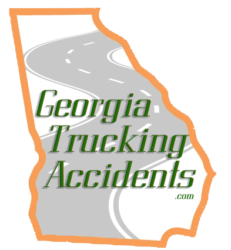Georgia Overloaded Truck Accident Lawyers, Lawsuits and Settlements
Overloading of trucks endangers every person, including the truck driver, sharing the road with the rig. Overloading is dangerous because the driver can easily lose control over the freight or experience an unexpected weight shift. Overloading can also make stopping extremely difficult. Overloaded vehicles need time and space to slow down. An excessively heavy load also places excessive strain on safety equipment as well as the suspension system, steering, braking, drive train, transmission, and engine. Everything must work harder to move the load.
Georgia essentially complies with the federal regulatory system regarding the maximum weight of a large truck. Under Georiga law, the maximum weight allowed without a permit is a gross weight vehicle weight rating of 80,000. However, the truck must comply with Federal Bridge Formula (FBF) for every truck weighing between 73,280 and 80,000 pounds. The maximum capacity of weight for a single axle is 20,000 pounds. Georgia has adopted exemptions for farm equipment traveling on non-interstate highways. The excess weight allowed depends on the freight. However, all exceptions relate to the delivery of livestock, crops, and other farm-related products.
A commercial trucker must obtain a permit to operate an overweight truck. A license may be granted if the overweight truck will not damage the road surface unduly. Additionally, permits may be obtained on a yearly basis to operate large trucks in Georgia with a gross vehicle rating of 100,000 pounds.
Carrying freight is more complicated than merely loading a trailer and slamming the doors. Georgia Department of Transportation (GDOT) safety regulations discusses in detail how a trailer or flatbed must be loaded to stabilize and evenly distribute the weight of the cargo. GDOT’s regulations require that drivers conduct a pre-trip inspection of the freight to confirm that the weight is evenly distributed and balanced. Moreover; the regulations expressly require the operator to make certain that the weight conforms to state and federal restrictions before leaving the loading depot. For example, the truck driver must confirm that his or her cargo complies with the federal regulations on securing cargo issued by the Federal Motor Carrier Safety Administration. Additionally, GDOT and federal regulations obligate the truck driver to re-inspect cargo every three hours or 150 miles driven and again before leaving a rest area after taking a break.
GDOT acknowledges the issues relating to an overweight truck. GDOT cautions drivers to plan their routes well in advance of departure. Drivers should become familiar with the routes and learn where elevation changes occur and steep grades could be encountered. GDOT suggests reducing weight to avoid climbing difficulty as well as stopping difficulty when descending from a peak. Weather also plays a role. Wet or snowy roads reduce friction with the truck’s tires, causing a loss of traction and control. An overweight load could get thrown off balance by an unexpected skid that could cause a rollover, jackknife, or other accident.
With tight delivery deadlines, drivers have an incentive to take as heavy of a load as possible. They could get fined if caught, but for some, it might be worth the risk of paying a fine. It is never worth the risk to human life. Truck drivers and trucking companies might take the risk if it means that more freight can be delivered because that means more money can be earned.
Put Our Law Firm’s Over 33 Years Of Legal Experience To Work For Your Case!
The time you have to legally receive compensation is limited.
Sources:
Cited within.

